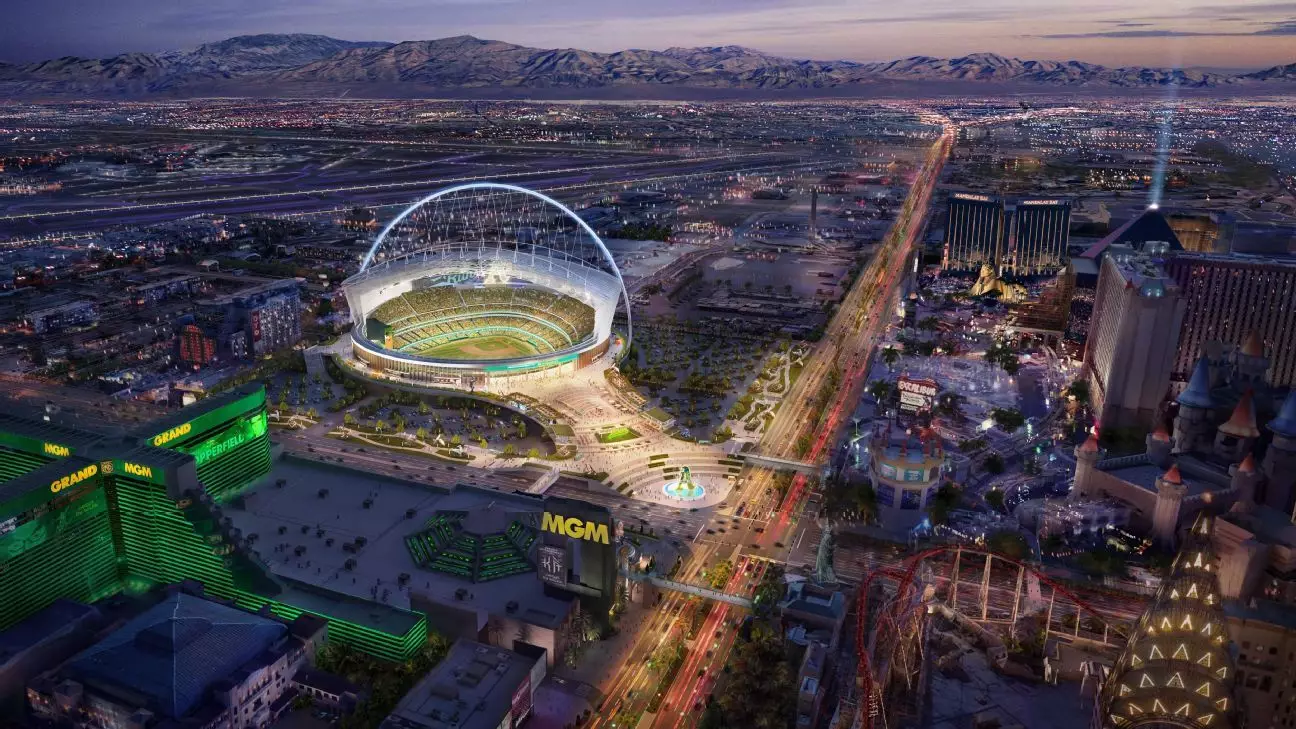The Las Vegas sports landscape is on the verge of transformation as the Oakland Athletics prepare to establish their new home in Nevada. Recently, the Las Vegas Stadium Authority took a monumental step forward by approving essential agreements for the Athletics’ ambitious $1.75 billion stadium project. The implications of this decision extend well beyond mere infrastructure; they signal a burgeoning interest in sports within the region and bolster Las Vegas’s reputation as a prime destination for major sporting events.
With lease and non-relocation agreements finalized for the span of 30 years, the stage is set for the Athletics to break ground on a stadium that could redefine the spectator experience. Steve Hill, CEO of the Las Vegas Convention and Visitors Authority, encapsulated the atmosphere of excitement during the board meeting, declaring it a “significant day in Las Vegas.” This enthusiasm was palpable, as applause and words of gratitude resonated throughout the room, underscoring the collective recognition of this pivotal moment in both sports and local development.
Looking ahead, the Athletics are positioned for a groundbreaking ceremony in the spring, signaling their aspiration to be ready for the highly anticipated 2028 MLB season. However, the journey is fraught with complexities. The team’s board member, Sandy Dean, emphasized the need for ongoing negotiations with Clark County on a development agreement. While progress has been made, the timeline is still in its infancy, indicating that many crucial details remain to be ironed out before construction can commence.
Nevertheless, the stadium project reflects an ambitious vision, elevated in scope and scale. The initial cost estimate has surged by $250 million, driven by inflation and a commitment to enhancing fan and player experiences. Innovative features like under-seat cooling systems and reimagined seating configurations are set to create a more engaging atmosphere. Dean acknowledged the potential for further cost escalations due to unpredictable factors such as fluctuating interest rates but reassured stakeholders of their intention to manage inflationary pressures effectively.
A key aspect of the stadium’s financing involves a significant public contribution from Nevada and Clark County, which will provide $380 million in funds. Importantly, this public financing is contingent on the Athletics investing a minimum of $100 million upfront, a threshold the team is working to surpass—having already committed $40 million. The financial situation illustrates a partnership model where public investment is predicated on reliable private financing.
In this vein, club owner John Fisher has escalated his family’s financial commitment to $1.1 billion, underlining a serious investment in securing the team’s future. Getting backing from major financial institutions such as U.S. Bank and Goldman Sachs, which are poised to issue a $300 million loan, adds a level of security to the undertaking. However, Dean stressed that any unforeseen overruns in costs remain the responsibility of the Athletics, a statement designed to instill confidence in the team’s financial discipline.
The quest for equity financing doesn’t end here, as Fisher continues to seek additional investors both locally and beyond. The future of the Athletics and the success of their transition to Las Vegas hinge on these financial partnerships. During the board meeting, assurances were presented through multiple letters confirming Fisher’s capability to meet financial obligations. This included specific assessments by financial experts corroborating his wealth and capacity to sustain backing for the stadium’s construction.
As the Athletics transition from their long-standing ties in Oakland, where they have spent over five decades, the move marks not only a change in location but also a shift in identity. While they will play their next few seasons in a minor league venue in West Sacramento, anticipation builds for their debut in a state-of-the-art stadium in Las Vegas.
The Athletics’ arrival would be a significant addition to an already burgeoning sports scene in Las Vegas, which hosts the NFL’s Raiders, NHL’s Golden Knights, and WNBA’s Aces. Collectively, these teams have achieved remarkable success, with the Golden Knights and Aces capturing three championships in recent years. The introduction of Major League Baseball to this vibrant market enhances Las Vegas’s appeal as a premier sports destination.
The recent player signings announced coinciding with the stadium agreement, like the acquisition of pitcher Luis Severino for a record $67 million, illustrate the Athletics’ commitment to building a competitive team. This aligns well with the city’s vision of not merely hosting sports events but nurturing high-caliber performances that resonate with fans.
As the dust settles on this critical development, one thing is clear: the Oakland Athletics are on track to infuse Las Vegas with a new kind of excitement and energy, creating a legacy that may redefine the future of sports in the region. With each step, they not only propel their team into a new era but also elevate the city’s status on the national sports stage.

